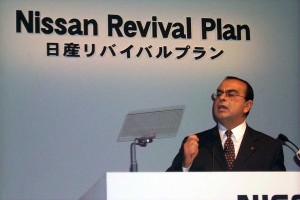
Nissan is reporting its first loss in a decade -- a setback for CEO Carlos Ghosn, who is shown here announcing the Nissan Revival Plan, in October 1999.
The toll from the global automotive recession continues to mount, with both Mazda and Nissan reporting losses, the larger maker its first in a decade.
But neither automaker approached the massive losses posted by the Japanese giant, Toyota, which underscored the depth and breadth of the latest downturn, which started out in the U.S. but has now spread across the globe.
Nissan’s loss for the fiscal year that ended March 31st came to $2.4 billion, or ¥233.7 billion. That’s actually a bit better than the ¥288 billion loss the company had earlier forecast, but a sharp reversal from the ¥482.3 billion profit of a year ago. Sales and revenues were also down sharply – though a wee bit better than earlier forecast. Worldwide volumes were off 9.5%, to 3.4 million vehicles, with revenues off 22%, at ¥8.437 trillion.
This marked the first time Japan’s third-largest automaker sunk into the red since CEO Carlos Ghosn was recruited from Nissan’s then-new alliance partner, Renault, to help turn around the once-failing Asian carmaker.
“The crisis is ongoing and market conditions are still volatile,” Ghosn told reporters during a meeting at Nissan’s headquarters, in Tokyo, but he added there are some modest reasons for optimism. “We are beginning to see some signs of improved access to credit, the impact of government stimulus packages and a gradual return in consumer confidence.”
Ghosn predicted another loss for the coming year, but said he expected it to be smaller, around ¥170 billion , with unit sales forecast to fall to 3.08 million cars, trucks and crossovers.
The normally vibrant Japanese auto industry has been decimated by the global downturn. The home market is operating at its lowest level since the 1970s, while demand abroad is weak virtually everywhere. That plunged the nation’s fifth-largest automaker into the red as well, Mazda Motor Company announced, on Tuesday.
The long-time Ford Motor Company affiliate revealed it lost $734.9 million, or ¥71.5 billion. The Hiroshima-based maker suffered a 22% decline in revenues, which fell to ¥2.54 trillion. A year ago, Mazda had reported a ¥91.8 billion profit.
“Our business environments are expected to remain challenging in the next fiscal year,” the company said in a statement.
The automaker expects another 13% decline in vehicle sales in the current fiscal year, which will close on March 31, 2010. Virtually all its markets, with the exception of China, are in a sharp slide, according to Mazda. But the company forecast that with the launch of its new small car, the Mazda3, it should be able to return to profitability by the second half of the current fiscal year.
Analysts are raising questions about both automakers in the wake of the ongoing recession. Complicating matters for Mazda was the decision by Ford to sell off most of its controlling stake in the Japanese company. As for Nissan, Ghosn’s challenges are complicated by the fact that he also serves as CEO of alliance partner Renault. The French company is deeply mired in the red, as well.
With many observers expecting a global shake-out, Ghosn weighed in, Tuesday, saying, “It is unclear who is going to emerge the winner.”
The Japanese maker is hoping to ensure its own fate by getting a jump on what many see is the future of the auto industry, the move to electric powertrains. Nissan announced, Tuesday, that it will begin producing battery-electric vehicles, at its Oppama Plant, near Tokyo, starting in late 2010. Initially production capacity of 50,000 units should reach “mass marketing” levels, the company said, by 2012.
